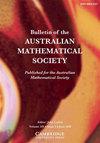包含一个序列项的集合
IF 0.5
4区 数学
Q3 MATHEMATICS
引用次数: 0
摘要
设$S=\{s_{1}, s_{2}, \ldots \}$是一个无界正整数序列,其中$s_{n+1}/s_{n}$逼近$\alpha $为$n\rightarrow \infty $,设$\beta>\max (\alpha , 2)$。我们证明了对于所有足够大的正整数l,如果$A\subset [0, l]$有$l\in A$, $\gcd A=1$和$|A|\geq (2-{k}/{\lambda \beta })l/(\lambda +1)$,其中$\lambda =\lceil {k}/{\beta }\rceil $,则$kA\cap S\neq \emptyset $为$2<\beta \leq 3$和$k\geq {2\beta }/{(\beta -2)}$或$\beta>3$和$k\geq 3$。本文章由计算机程序翻译,如有差异,请以英文原文为准。
SUMSETS CONTAINING A TERM OF A SEQUENCE
Abstract Let $S=\{s_{1}, s_{2}, \ldots \}$ be an unbounded sequence of positive integers with $s_{n+1}/s_{n}$ approaching $\alpha $ as $n\rightarrow \infty $ and let $\beta>\max (\alpha , 2)$ . We show that for all sufficiently large positive integers l , if $A\subset [0, l]$ with $l\in A$ , $\gcd A=1$ and $|A|\geq (2-{k}/{\lambda \beta })l/(\lambda +1)$ , where $\lambda =\lceil {k}/{\beta }\rceil $ , then $kA\cap S\neq \emptyset $ for $2<\beta \leq 3$ and $k\geq {2\beta }/{(\beta -2)}$ or for $\beta>3$ and $k\geq 3$ .
求助全文
通过发布文献求助,成功后即可免费获取论文全文。
去求助
来源期刊
CiteScore
1.20
自引率
14.30%
发文量
149
审稿时长
4-8 weeks
期刊介绍:
Bulletin of the Australian Mathematical Society aims at quick publication of original research in all branches of mathematics. Papers are accepted only after peer review but editorial decisions on acceptance or otherwise are taken quickly, normally within a month of receipt of the paper. The Bulletin concentrates on presenting new and interesting results in a clear and attractive way.
Published Bi-monthly
Published for the Australian Mathematical Society

 求助内容:
求助内容: 应助结果提醒方式:
应助结果提醒方式:


